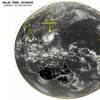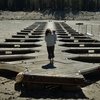Health Issues Follow Natural Gas Drilling In Texas
Vast new natural gas fields have opened up thanks to an advanced drilling technique. While natural gas is a cleaner burning fuel than coal or petroleum, extracting it is still hard, dirty work. Some people who live near the massive Barnett Shale gas deposit in north Texas, have complaints. Health and environmental concerns are prompting state regulators to take a closer look.
Copyright © 2009 NPR. For personal, noncommercial use only. See Terms of Use. For other uses, prior permission required.
RENEE MONTAGNE, host:
A boom in natural gas is underway. New gas fields have opened up thanks to an advanced drilling technique. It allows gas to be extracted from underground shale rock formations. Natural gas is a cleaner burning fuel than coal or petroleum, though extracting it is still hard, dirty work. And some people who live near some major gas projects are complaining. NPR's John Burnett has this story from the massive Barnett Shale gas deposit in North Texas.
JOHN BURNETT: To date there are more than 12,000 gas wells in the Barnett Shale. It's a vast rock formation that underlies 5,000 square miles surrounding Fort Worth. To get the gas to market requires an underground highway of pipelines and compression stations. These big internal combustion engines make noise and spew pollutants into the air day and night. State records show that in the past decade the number of gas compressors in the Barnett has jumped from a few hundred to 1,300, and they're getting closer and closer to populated areas.
Mayor CALVIN TILMEN (Dish, Texas): My name is Calvin Tillman. I'm the mayor of a small town of Dish, Texas, the home of free Dish Network satellite TV, and it is also known for 11 natural gas compression stations.
BURNETT: Tillman stands in a field next to the compressor complex along a fence line of trees that died after the engines moved in. His tiny town changed its name to Dish in return for free satellite TV, but the corporate tradeoff with the gas companies has been less beneficial. The compressors sit on the southern boundary of Dish.
The mayor repeatedly complained to state regulators about smell, noise and health problems that his residents were reporting, but nothing happened. So last summer, Dish spent 15 percent of its $70,000 annual budget on a private environmental consultant.
Mayor TILLMEN: And the air study showed extremely high levels of both carcinogens and neurotoxins, and so that's just caused us a lot of concern.
BURNETT: A memo written last week by the top toxicologist at the Texas Commission on Environmental Quality expressed concern that the presence of benzene, a potentially cancer-causing toxin detected near the compressors, could pose long-term health risks.
Megan Collins(ph), a 32-year-old pediatric nurse, lived with her husband, a firefighter, and their two small children downwind from the compressors. She started having unexplainable symptoms: headaches, dizziness, blackouts, muscle contractions. She got test after test while her condition worsened, but she never really worried about the compression stations.
Ms. MEGAN COLLINS (Pediatric Nurse): We just always constantly heard the noise and constantly smelled the fumes. But every time we would ask, they would always just say that it was normal.
BURNETT: Then Collins read a newspaper story about the results of the Dish air emissions study. She says since her family has moved away from town, her symptoms have begun to ease.
Ms. COLLINS: I'm convinced, sadly convinced, that it's the emissions. I mean for doctor after doctor after doctor to tell me that I'm a mystery�
BURNETT: While Megan Collins grew sicker, something strange began to happen to Lloyd Burgess's(ph) horses. He runs a trucking company next to the compression station and he used to board horses on his property.
Mr. LLOYD BURGESS: I had a stallion here that we lost, ended up dying, had another mare in the same stall. She got a neurological defect and went blind in both eyes, had to put her down. There was a stud in the first stall down there, been here for about two years, and he got sick. I had to move him somewhere else.
BURNETT: No Dish resident has been able to prove the compression stations made them or their animals ill. For their part, the five gas companies that own the compressors have criticized the Dish air emissions study as flawed and inconclusive. They maintain their facilities do not affect public health.
The Texas Pipeline Association says its members are anxious to work with cities to resolve these issues to the benefit of both sides. Terri Larson is a spokesperson for Enbridge Energy, which owns three compressors in Dish.
Ms. TERRI LAWSON (Enbridge Energy): We're in compliance with state regulations. We are concerned about this issue. We are investigating it fully. We have been responsive. We'll continue to be responsive to requests from Mayor Tillman and our neighbors.
BURNETT: There's also the noise issue. Away from Dish, about an hour and a half southeast of Dallas, in Freestone County, retired engineer Charles Morgan(ph) expected to live out his days drinking coffee and watching his cows on his ranch. Then in 2005 the compressors started moving in.
(Soundbite of compressors)
BURNETT: Morgan stands on his fence line overlooking 10 steel buildings that hound the compressors, which together exceed 12,000 horsepower.
Ms. CHARLES MORGAN: I lived here for 21 years, perfect health, don't even take an aspirin until these things showed up. And when they really started running amok(ph), that's when all these problems started occurring.
BURNETT: Morgan claims the constant low frequency roar from the compressors has twice ruptured his right ear drum and caused him such distress, at times he's checked into a hotel. A neighbor who lives on the other side of the compressor station confirmed he and his infant daughter also suffered ruptured ear drums.
A spokesman with Anadarko Petroleum, which owns the compressors, says the company is committed to being a good neighbor and that Morgan refused attempts to take acoustic readings at his house. Morgan says he doesn't trust the company.
At the moment, most of the concern in Texas is focused on air emissions more than noise, which is scarcely regulated in rural areas. The worry is that compression stations may individually meet state and federal regulations for air emissions, but what's the cumulative effect of a complex like the one at Dish?
Mr. AL ARMENDARIZ (Southern Methodist University): If you were to aggregate the emissions from all of these 11 compressor engines and all of the associated piping and meters and valves and everything else at these facilities, you can get a significant source of emissions, hundreds of tons per year.
BURNETT: Al Armendariz is an environmental engineer at Southern Methodist University in Dallas who wrote a widely circulated report earlier this year. He estimated gas production, processing, and transmission in the Barnett Shale produces nearly as much air pollution as all the region's vehicle traffic. State regulators validated his numbers.
Mr. ARMENDARIZ: So our conclusion was that the oil and gas production industry around Fort Worth is a major contributor to both local and global air pollution problems.
BURNNET: Gas booms are coming to other shale formations around the country: in Louisiana, Pennsylvania and Oklahoma. Armendariz warns if the industry is contaminating the air and making people sick, and if regulators aren't doing enough about it, communities won't want the drilling rigs. Dish Mayor Calvin Tillman has some hard-earned advice.
Mayor TILLMAN: If you don't learn from what has happened here, by the time that the odor gets bad enough for you to not want it there, by the time that the noise gets loud enough that it's disturbing you, it's already too late.
BURNETT: Concerned that gas facility emissions may be more hazardous than previously thought, Texas air quality regulators have undertaken a large scale air monitoring project in the Barnett Shale. Results are expected early next year. One of the places they tested is the town of Dish.
John Burnett, NPR News.
Copyright © 2009 NPR. All rights reserved. No quotes from the materials contained herein may be used in any media without attribution to NPR. This transcript is provided for personal, noncommercial use only, pursuant to our Terms of Use. Any other use requires NPR's prior permission. Visit our permissions page for further information.
NPR transcripts are created on a rush deadline by a contractor for NPR, and accuracy and availability may vary. This text may not be in its final form and may be updated or revised in the future. Please be aware that the authoritative record of NPR's programming is the audio.
Comments
You must be signed in to leave a comment. Sign In / Register
Please keep your community civil. All comments must follow the NPR.org Community rules and terms of use, and will be moderated prior to posting. NPR reserves the right to use the comments we receive, in whole or in part, and to use the commenter's name and location, in any medium. See also the Terms of Use, Privacy Policy and Community FAQ.







